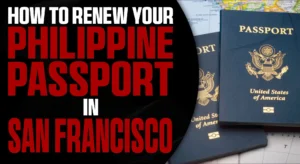How to Renew Your Philippine Passport in San Francisco
If you're in San Francisco and need to renew your Philippine passport, this guide has everything you need. It includes step-by-step instructions, links for scheduling appointments, and the latest fees from the Philippine Consulate General in San Francisco.

If you’re in San Francisco and need to renew your Philippine passport, this guide has everything you need. It includes step-by-step instructions, links for scheduling appointments, and the latest fees from the Philippine Consulate General in San Francisco.
Philippine Passport Renewal in San Francisco, California: Your Complete Guide
This in-depth guide is specifically for Filipino citizens residing in San Francisco, California, and within the extensive consular jurisdiction of the Philippine Consulate General in San Francisco. This jurisdiction encompasses a wide range of states: Alaska, Idaho, Oregon, Washington, Colorado, Montana, Utah, Wyoming, Nevada, and Northern California (including Silicon Valley, Sacramento, and the Bay Area).
Crucial Information Before You Begin:
- Personal Appearance is REQUIRED: All Philippine passport applications, including renewals, must be processed in person at the Consulate General in San Francisco.
- Appointment is MANDATORY: You must secure an online appointment. Walk-ins are generally not permitted for regular passport services, though exceptions might be made for urgent, documented emergencies or special categories (like seniors, pregnant applicants, PWDs, or minors 7 years old and below with immediate travel needs, at the discretion of the Consular Officer). Always prioritize getting an appointment.
- No Photocopying/Printing Services: The Consulate doesn’t provide these services. Make sure you bring all required original documents and their complete photocopies.
- Photo Capture On-Site: Your passport photo will be taken digitally at the Consulate during your appointment. You don’t need to bring your own photos.
- Processing Time: Expect your new Philippine passport to be ready in approximately six (6) to eight (8) weeks from your application date.
- Renew Early: To avoid any travel issues, it’s highly advisable to renew your Philippine passport at least six (6) to nine (9) months before its expiration date.
Philippine Consulate General in San Francisco: Contact Details
Having the correct contact information for the Philippine Consulate General in San Francisco is key for a smooth Philippine passport renewal process.
- Address: 447 Sutter Street, 6th Floor San Francisco, CA 94108, U.S.A.
- Contact Numbers:
- Main Line: +1 (415) 433-6666
- Emergency Hotline: +1 (415) 269-2090 (for emergencies only)
- Email Addresses:
- General Inquiries: sfpcg.info@dfa.gov.ph
- Passport Services: sfpcg.passport@dfa.gov.ph
- Official Websites:
- Business Hours:
- Monday – Friday, 9:00 AM to 5:00 PM (Pacific Time) (Closed on Philippine and U.S. holidays. Always check their website for specific holiday schedules and advisories.)
Step-by-Step Philippine Passport Renewal Process in San Francisco
Renewing your Philippine passport in San Francisco involves a clear sequence of steps, starting with booking your essential online appointment.
Secure Your Online Passport Renewal Appointment (Mandatory)
- Access the DFA Online Appointment System: Go to the official Department of Foreign Affairs (DFA) passport appointment portal.
- Select Location: Choose “Consulate General in San Francisco” as your preferred processing site.
- Choose Date and Time: Select an available date and time slot that suits you. Due to high demand for Philippine passport renewal services in the Bay Area and the Consulate’s large jurisdiction, appointment slots can fill up quickly. Be patient and check the portal regularly, as new slots are released periodically.
- Complete the Online Application Form: Fill out all required fields accurately and completely. Double-check all personal information to avoid future errors.
- Receive Confirmation: Once your booking is successful, you’ll receive a confirmation email from
appointment@passport.gov.ph. This email will contain your appointment confirmation and the attached passport application form. - PRINT ALL DOCUMENTS: It’s crucial to print out the entire Passport Application Packet, especially the form with the barcode, which is attached to your confirmation email. Bring this complete printed packet with you to your appointment.
Prepare Your Documents for Philippine Passport Renewal
Gather all necessary original documents and their corresponding photocopies before your scheduled appointment. Remember, the Philippine Consulate in San Francisco does not offer photocopying or printing facilities.
Core Requirements for e-Passport Renewal (Maroon passport with chip logo):
- Printed Passport Application Form: The form with the barcode that you printed from your appointment confirmation email.
- Latest Philippine Passport: Bring the original and one (1) photocopy of your current Philippine e-passport’s data page (the page containing your photo and personal information).
- Proof of Legal Status in the U.S.: Provide the original and one (1) photocopy of any of the following:
- U.S. Permanent Resident Card (Green Card / Form I-551)
- Valid U.S. Visa (e.g., H1B, F1, J1, B1/B2)
- Employment Authorization Document (EAD)
- For Dual Citizens (RA 9225): Original and one (1) photocopy of your Identification Certificate, Oath of Allegiance, Order of Approval, or Certificate of Retention/Re-acquisition of Philippine Citizenship issued by the Bureau of Immigration. If citizenship is by birth, provide your original and photocopy of a PSA-issued Birth Certificate or PSA-issued Report of Birth.
- Self-Addressed Stamped Return Envelope:
- One (1) USPS Priority Mail Flat Rate Envelope with sufficient postage (currently USD 10.10 in stamps for up to 1 lb) and a tracking number.
- Alternatively, a pre-paid courier envelope from a service like FedEx or UPS with a tracking number.
- Crucially, write your complete name and mailing address clearly and legibly on the “Recipient/To” spaces. Leave the “Sender/From” space blank.
- The Consulate General assumes no responsibility for any loss or damage of passports sent through mail.
Additional Requirements (If Applicable) for Philippine Passport Renewal:
- For Applicants with Changed Name (due to marriage, annulment, or Philippine court order):
- Original and one (1) photocopy of PSA-issued Marriage Certificate / Report of Marriage (if married outside the Philippines, ensure it has been reported to the appropriate Embassy/Consulate first and is PSA-authenticated).
- Original and one (1) photocopy of PSA-issued Annotated Birth Certificate.
- Original and one (1) photocopy of PSA-issued Annotated Marriage Contract showing annulment/divorce/court order.
- Original and one (1) photocopy of PSA-issued Marriage and Death Certificate of spouse (for widows/widowers).
- Note: Your passport name will strictly follow the name recorded in your PSA documents. Non-PSA documents are generally not accepted for name changes. If you need PSA documents, you can order them online via PSA Birth Certificate Online Application and Delivery or Online Certificates Worldwide Delivery.
- For Renewal of Older Passports (Brown, Green, Machine-Readable Maroon Passports issued before September 17, 2007): These are processed as new applications. In addition to the core requirements above, you will also need:
- Original and one (1) photocopy of your PSA-issued Birth Certificate on Security Paper.
- Original and one (1) photocopy of your PSA-issued Marriage Certificate / Report of Marriage (if married and using husband’s surname).
- Original and one (1) photocopy of valid IDs as proof of identification and citizenship (e.g., US Driver’s License, State ID, Philippine IDs like SSS Card, Senior Citizen ID, School ID, PWD ID, Voter’s ID, PhilID).
- For Minor Applicants (below 18 years old):
- Personal appearance of the minor applicant, accompanied by at least one parent or legal guardian.
- Original and one (1) photocopy of PSA-issued Birth Certificate of the minor.
- Passports or Valid Government-issued IDs of both parents or the legal guardian (original and photocopy).
- School ID of minor (if available).
- If only one parent is accompanying:
- If parents are married, an Affidavit of Consent from the absent parent may be required, along with a copy of their valid ID.
- If parents are not married, the mother typically has sole parental authority.
- For legal guardians, an Affidavit of Guardianship and relevant court documents.
- For Lost Passports:
- Printed Application Form from the Online Appointment System.
- Photocopy of latest issued passport (if available).
- Original and photocopy of green card or US visa.
- Original and photocopy of PSA-issued Birth Certificate.
- Original and photocopy of valid ID (Driver’s license, State ID, Philippine ID).
- Notarized Affidavit of Loss.
- Police Report (required if the lost passport is still valid). A waiting period (e.g., 15 days) may apply before a new passport can be issued for lost valid passports. Confirm this with the Consulate.
- For Mutilated/Damaged Passports:
- Surrender the original damaged/mutilated passport.
- Notarized Affidavit of Explanation for the damaged passport.
- Submit requirements similar to a lost passport or new application, depending on the extent of damage.
Photo Requirements:
- Photos are taken at the Consulate: The Philippine Consulate General in San Francisco will capture your passport photo digitally during your appointment. You DO NOT need to bring your own passport photos.
- Dress Code: Please wear decent attire. Avoid sleeveless tops or plunging necklines.
- Appearance: You’ll be asked to remove eyeglasses, tinted contact lenses, and any accessories that obscure your face. Maintain a neutral facial expression with your mouth closed.
Proceed to the Philippine Consulate General in San Francisco for Your Appointment
- Arrive On Time: Be punctual for your scheduled appointment. Arriving too early might not grant you immediate entry, and arriving late could lead to the forfeiture of your slot.
- Bring All Documents: Ensure you have all required original documents and their complete photocopies, including your self-addressed stamped return envelope.
- Passport Fee: The standard processing fee for e-Passport renewal is USD 60.00.
- Payment methods accepted at the Philippine Consulate General in San Francisco typically include cash or money order payable to “Philippine Consulate General.” While some Consulates accept credit/debit cards, there might be a convenience fee, or it might not be consistently available, so cash or money order is often the most reliable option.
- Fees for lost passports are higher (e.g., USD 150.00 for lost e-passport, USD 90.00 for lost non-e-passport).
- Biometrics and Interview: You will undergo biometric capturing (digital photo and fingerprints) and a brief interview with a Consular Officer. The Consular Officer has the right to request additional documents if deemed necessary to confirm your identity, citizenship, or ensure accurate data.
Tracking and Receiving Your New Philippine Passport in San Francisco
After successfully submitting your application, you’ll naturally want to know when your new passport will arrive.
Tracking Your Passport Application
- DFA Passport Tracking System: The primary tool to track the status of your Philippine passport application is the official Department of Foreign Affairs (DFA) Passport Tracking System. You can usually access this at Passport Appointment System.
- Input Application Details: You will typically need to enter your application reference number (found on your appointment confirmation or the receipt provided by the Consulate) or your surname and date of birth.
- Status Updates: This system will inform you whether your passport is still being processed in Manila, has been printed, or has been dispatched to the Consulate for release.
- Consulate-Specific Inquiry: If you experience significant delays beyond the indicated processing time (6-8 weeks), or if the DFA tracking system provides unclear information, you may contact the Philippine Consulate General in San Francisco directly via email (
sfpcg.passport@dfa.gov.ph) with the subject “Passport Status Inquiry” and provide your full name and application date.
Claiming Your New Passport and Cancellation of Old Passport
- Delivery via Mail: Your new Philippine passport will be mailed to the address you provided on your self-addressed, stamped USPS Priority Mail or prepaid courier envelope. This is the standard and most convenient delivery method.
- Cancellation of Old Passport: When you receive your new passport, your old passport will typically be returned to you with its corners clipped, indicating that it is no longer valid for travel. This cancellation is part of the renewal process. The old passport is returned for your records and as proof of your previous visas and travel history.
- Immediate Verification: As soon as you receive your new Philippine passport, immediately inspect all entries for accuracy. Carefully check your full name, date of birth, place of birth, gender, passport number, issue date, and expiry date.
Unclaimed Passports
- Retention Policy: The Philippine Consulate General in San Francisco, like other Philippine Foreign Service Posts, typically holds unclaimed passports for a specific period, usually a maximum of one (1) year from the date they become available for release.
- Disposal Policy: Passports that remain unclaimed beyond this designated retention period may be cancelled and officially disposed of by the Department of Foreign Affairs (DFA) in accordance with Philippine passport laws and regulations.
- Contact Early: If you encounter any issues with receiving your passport via mail or if it is delayed, contact the Consulate’s Passport Section promptly to inquire about its status and prevent it from being categorized as unclaimed.
If Your New Passport Contains Errors
- Report Promptly: Should you discover any discrepancies or errors in your newly issued Philippine passport (e.g., misspelled name, incorrect birthdate, wrong gender, etc.), it is imperative that you notify the Philippine Consulate General in San Francisco immediately upon discovering the error.
- Correction Process: You will generally be required to return the erroneous passport to the Consulate. You will also need to submit supporting original documents (e.g., PSA Birth Certificate, PSA Marriage Certificate) that clearly prove the correct information.
- Fees for Correction: If the error is determined to be the Consulate’s mistake, there is typically no additional fee for the correction. However, if the error resulted from incorrect information provided by the applicant, new application fees and a re-application process might be necessary.
- Processing Time for Corrections: Be aware that correcting an erroneous passport will take additional time, similar to the initial processing period for a new passport.
Passport Validity and Usage Guidelines
Understanding your passport’s validity and knowing how to properly use and care for it are essential for international travel from San Francisco or any other location.
- Passport Validity
- For Adults (18 years old and above): Philippine passports issued to adult citizens are valid for ten (10) years.
- For Minors (below 18 years old): Passports issued to minors are valid for five (5) years.
- Validity Start Date: The validity period officially begins from the date of issue printed on your passport.
- The Critical Six-Month Rule
- International Travel Requirement: A significant number of countries worldwide, including major travel destinations, mandate that your passport be valid for at least six (6) months beyond your intended date of departure from their territory. This is a crucial rule for hassle-free international travel.
- Airline and Immigration Impact: Airlines strictly enforce this rule and may deny you boarding if your passport doesn’t meet the six-month validity requirement. Similarly, immigration authorities at your destination can deny you entry.
- Proactive Renewal: To avoid any last-minute travel complications, it’s strongly advised to initiate your Philippine passport renewal when your passport has less than one year of validity remaining.
- Proper Care of Your New ePassport
- Your Philippine ePassport contains an embedded microchip that stores your personal and biometric data. Protecting this chip is vital for your passport’s functionality and longevity.
- Do Not Bend or Fold: Avoid bending, folding, or creasing your passport, especially the back cover where the microchip is located. Physical damage to the chip can render your passport unreadable.
- Protect from Extremes: Do not expose your passport to excessive heat (like direct sunlight on a car dashboard) or extreme cold.
- Keep Dry: Guard your passport against water damage or any other liquids. Never attempt to wash or immerse it.
- No Puncturing or Stapling: Refrain from punching holes, stapling, or making any alterations to the passport that could damage the embedded chip or its antenna.
- Handle with Care: Treat your passport as a highly valuable and sensitive document. Avoid placing heavy objects on it or using it casually.
- Avoid Strong Magnetic Fields: Keep your ePassport away from strong magnetic sources, which have the potential to corrupt the data stored on the microchip.
- Report Damage: If your ePassport appears to be damaged or becomes unreadable by electronic readers, contact the Philippine Consulate General in San Francisco immediately for assessment and guidance on replacement.
- Additional Visa Pages
- No Expansion Available: Modern Philippine ePassports are designed without the option to add extra visa pages. The number of pages provided at issuance is fixed.
- New Passport Required: If you are a frequent international traveler and fill up all the visa pages in your current ePassport, you will need to apply for an entirely new passport.
- Monitor Page Usage: If you travel extensively, keep an eye on your remaining visa pages and plan for an early renewal to ensure you have sufficient space for new visas and entry/exit stamps.
Conclusion: Your Passport Journey in San Francisco Complete, Travel Safely!
Successfully renewing your Philippine passport in San Francisco, California, is an essential step in maintaining your connection to the Philippines and ensuring your unhindered international mobility. By meticulously following the detailed guidelines provided by the Philippine Consulate General in San Francisco – from securing your appointment and preparing all necessary documents to understanding the processing and delivery protocols – you can navigate this essential process with confidence.
Always remember the critical reminders: personal appearance is required, appointments are mandatory, and proactive renewal is always the best practice, especially considering the “Six-Month Rule” for international travel. Proper care of your new ePassport will ensure its longevity and functionality for years to come.
With your newly issued Philippine passport in hand, you have successfully completed this important administrative journey. You are now ready to continue your travels, visit family, or return to the Philippines with peace of mind.
Journey Complete! We wish you Travel Safely! May your renewed Philippine passport unlock new opportunities and facilitate smooth and worry-free international experiences from the Bay Area and beyond.







